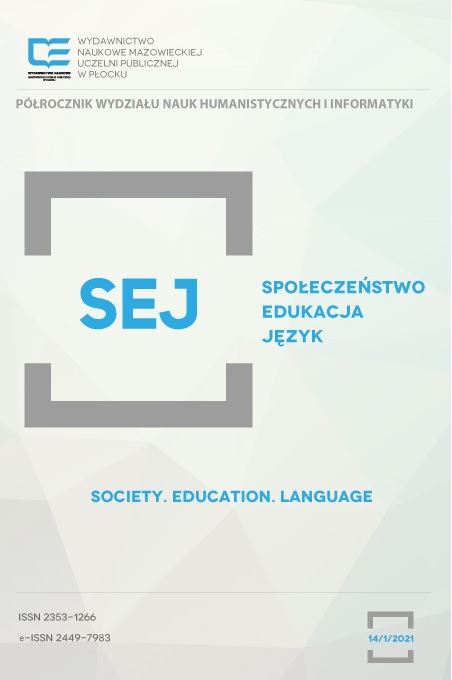NUTRITIONAL BEHAVIORS OF STUDENTS DURING ELECTRONIC LEARNING
DOI:
https://doi.org/10.19251/sej/2021.14.1(18)Keywords:
COVID-10, dietary habits, studentsAbstract
In March 2020, the World Health Organization announced the COVID-19 pandemic. Many countries, including Poland, have been forced to introduce strict sanitary regimes and social distancing measures. One of the restrictions applied in our country is the realization of school education and higher education in the form of electronic learning.
The purpose of this study was to assess the changes in behaviors and eating habits of students, who had been studying with the use of electronic learning methods during the last year. It can be classified as a stressful situation that affects eating behaviors.
The research was conducted in March 2021 among students of the Faculty of Health Sciences at the Masovian Public University in Płock on the basis of the diagnostic survey with the use of the author’s questionnaire. The selection of the group was deliberate. Students were learning in a remote way for one calendar year. The participation in the research was voluntary and the principle of anonymity was respected.
The questionnaire was completed by 247 women. In connection wit the introduction of restrictions connected with the pandemic, increased stress was declared by 43% of students, and 61% of respondents reported recurrent felling of dissatisfaction. The increase in body weight since the introduction of electronic learning was noticed by 40% of women, and its decrease was declared by 20% of respondents. The vast majority of respondents ate 4 meals a day. Students reported that they more often eat breakfast, soups, vegetables and fruits, whole grain products, as well as they drink water and tea. However, a significant group (45%) of respondents eat additional snacks between meals. The respondents reported more frequent consumption of sweets, fast-food products, crisps and salty snacks. Almost 60% of examined persons also stated that they eat meals more often while learning – in front of the computer.
It would seem that the pandemic period, when special attention is paid to a healthy lifestyle, including a properly balanced diet, should result in the application of the rules of healthy eating. However, this is not always the case. It turned out that, for example, students, who study in a remote way, make numerous dietary mistakes and they justify them by frequent negative emotions caused by electronic learning.
References
Babauta, Leo. 2019. Nawyki Zen. Mała ksiażka na resztę życia. Gliwice: Helion SA.
Babicz-Zielińska, Ewa. 2006. Role of psychological factors in food choice. A review. Polish Journal of Food and Nutrition Sciences, 15: 379-384.
Bhaskaram, Padbidri. 2002. Micronutrient malnutrition, infection, and immunity: An overview. Nutririon Reviews, 60, S40-S45.
Canetti, Laura; Bachar, Eytan i Berry, Elliot M. 2002. Food and emotion. Behavioural Processes, 60:157–164.
Charzewska, Jadwiga i Wolnicka, Katarzyna. 2013. Szkoła i przedszkole przyjazne żywieniu i aktywności fizycznej. Poradnik dla nauczycieli. Warszawa: IŻŻ.
Desmond, Małgorzata. Dieta a COVID-19. Dostęp: 9.04.2021 https://malgorzatadesmond.com/polecane/dieta-a-covid-19-2441/
Epel, Elissa; Lapidus, Rachel; McEwen, Bruce i Brownell, Kelly. 2001. „Stress May Add Bite to Appetite in Women: A Laboratory Study of Stress-Induced Cortisol and Eating Behavior.” Psychonueroendocrinology, 26, 37-49.
Forkert, Elsie C.O. et al. 2019. Skipping breakfast is associated with adiposity markers especially when sleep time is adequate in adolescents. Scientific Reports, 6380.
Gajewska, Danuta i Jeżewska-Zychewicz, Marzena. 2006. Pojadanie między posiłkami – przyczyny i skutki. Dostęp: 9.04.2021 http://www.wszechnicazywieniowa.sggw.pl/web/pojadanie.pdf
Gawęcki, Jan i Hryniewiecki, Lech. 2017. Żywienie człowieka. Podstawy nauki o żywieniu. Warszawa: PWN.
Geliebter, Allan i Aversa, Angela. 2003. Emotional eating in overweight, normal weight, and underweight individuals. Eating Behaviors, 3: 341-347.
Hudd, Suzanne et al. 2000. Stress at college: Effects on health habits, health status and self-esteem. College Student Journal, 34, 217- 227.
Jarosz, Mirosław. 2010. Praktyczny podręcznik dietetyki. Warszawa: IŻŻ.
Kowalska, Anna. 2014. Mleko i przetwory mleczne w diecie studentów uniwersytetu ekonomicznego we Wrocławiu. Roczniki Naukowe Stowarzyszenia Ekonomistów Rolnictwa i Agrobiznesu, XVI, 111-113.
Kuo, Lydia et al. 2007. Neuropeptide Y acts directly in the periphery on fat tissue and mediates stress — induced obesity and metabolic syndrome. Nature Medicine, 13: 803–811.
Monzani, Alice et al. 2019. A Systematic Review of the Association of Skipping Breakfast with Weight and Cardiometabolic Risk Factors in Children and Adolescents. What Should We Better Investigate in the Future? Nutrients, DOI: https://doi.org/10.3390/nu11020387.
Ogińska-Bulik, Nina. 2000. Emocje jako przyczyna nadmiernego jedzenia. Zeszyty Naukowe WSHE w Łodzi, 8 -13.
Peter, Agnieszka; Odrowąż-Sypniewska, Grażyna i Gruszka, Marzena. 2005. Rola wapnia w organiźmie. Przegląd Medycyny Laboratoryjnej, 2 (4) : 13-16.
Potocka, Adrianna i Mościcka, Agnieszka. 2011. Stres oraz sposoby radzenia sobie z nim a nawyki żywieniowe wśród osób pracujących. Medycyna Pracy, 62 (4):377–388.
Seeling, Mildread S. 1994. Consequences of magnesium deficiency on the enhancemennt of stress reactions; preventive and therapeutic implications (a review). Journal of the American Collage of Nutririon, 13, 429-446.
Sidor, Aleksandra i Rzymski, Piotr. 2020. Dietary Choices and Habits during COVID-19 Lockdown: Experience from Poland. Nutrients, 3; 12 (6):1657.
Somer, Elizabet. 1998. Wpływ jedzenia na nastrój. Warszawa: Amber.
World Health Organization WHO. Nutrition advice for adults during the COVID-19 outbreak. Dostęp: 9.04.2021 https://www.emro.who.int/nutrition/nutrition-infocus/nutrition-advice-for-adults-during-the-covid-19-outbreak.html
World Obesity Federation. 2021. Covid-19 and Obesity. Dostęp: 9.04.2021 https://www.
worldobesityday.org/assets/downloads/COVID-19-and-Obesity-The-2021-Atlas.pdf
Wu, Ping. et al. 2008. Alcohol abuse/dependence symptoms among hospital employees exposed to a SARS outbreak. Alcohol. Alcohol., 43, 706–712.
Yau, Yvonne H.C. i Potenza, Marc N. 2013. Stress and eating behaviors. Minerva Endocrinologica, 38, 255-267.
